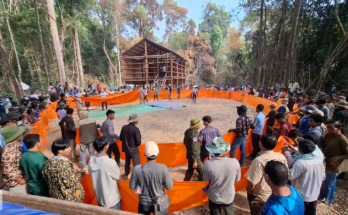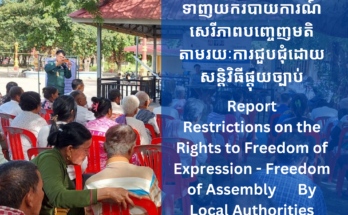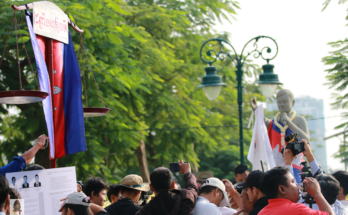Minimum Conditions for A Free and Fair 2022 Commune Council Election in Cambodia
Cambodian civil society organisations make the following recommendations for the minimum conditions for a legitimate 2022 commune council election based on the principles of genuine, free, and fair elections. These principles are drawn from the Cambodian Constitution, international instruments and treaties, the Paris peace agreement, the recommendations of various United Nations bodies, and other stakeholders such as the IPU Standards on Free and Fair Elections. These conditions are responsive to the current Cambodian political context aimed at resulting in a political compromise solution.
- Free Political Environment
Restoration of freedom of expression, peaceful assembly, association and press, and political rights at least from now and during post election period:
1.1: The Royal Government and all political actors, including all newly-formed or reformed political parties, must hold a political reconciliation dialogue to reduce tensions and encourage more open public debate.
1.2: The Royal Government ensures freedom from fear that allows people to freely exercise their fundamental rights before, during, and after elections.
- Political Rights and the Right to Stand for Elections
Restoration of political rights that allow active participation in political life and stand for elections.
2.1: Free and drop politically motivated charges against political and civil society figures and grant political rights to all opposition politicians without discrimination.
2.2: Pardon all individuals convicted of politically-motivated charges.
2.3: Grant all political parties the right to freely participate in the political process.
- Will of the Voters and the Right to Vote
Protection of the expression of the will of the electorate, wherein representatives are chosen through the elections. Those elected representatives exercise power within the confines of the Constitution and the Law. Representatives are accountable for the usage of those powers through the electoral process.
Elected representatives win and hold their seats both as individuals and as their political party mandate and can not be removed from their position solely because of their political party’s dissolution. All articles of the Lawson political parties and on elections unilaterally changed by the ruling party should be amended to reflect the state of the Law before 2017 to ensure bi-partisan decision-making practices with respect to rules for elections.
- Composition of the National Election Committee
In accordance with chapter 15 of the constitution and the Law on the Organisation and Functioning of the National Election Committee, the National Election Committee (NEC) is comprised of four commissioners selected by the ruling party, four chosen by the opposition party having seats in the National Assembly, and one commissioner accepted by both parties. The main opposition party needs to be allowed to review and select four commissioners.
- An Independent and Neutral Armed Forces and Courts
Strengthen enforcement of the Law on Political Parties, the Law on the General Status of Military Personnel of the Royal Cambodian Armed Forces, and the Law on Elections to ensure that the military, police, and courts are not politically partisan. Members of the military, police, or courts shall not hold any appointed office in any political party, including holding any responsible position or delegating tasks in any political party’s structure. They shall not carry out activities in support of or against any political party.
- Role of Civil Society and the Independent Media
Independent media outlets and civil society organisations are able to exercise their rights and roles in a democratic society freely.
6.1: Civil society organisations are able to gather and join in coalition with one another without legal constraints, organise collective action, monitor and report/present their finding of the elections, and express their opinion on enforcement or decisions of the Royal Government without any any forms of harassment.
6.2: A vital test of the health of any democratic election is through the existence of space for journalists and human rights defenders to do their legitimate work without harassment and intimidation by the Government and/or authorities.
6.3: All independent media outlets are able to apply for and receive licenses to open their offices and studios in Cambodia.
For further information:
- Dr. Pa Chanroeurn 012 766 364
- Yong Kim Eng 016 828 211
- Chan Ramy 012 663 937
- Chhan Sokunthea 093 831 990
- Ny Sokha 086 374 666
- Kim Chhorn 012 942 019
The document summary from full version which endorsed by:
- Center for Alliance of Labor and Human Rights (Central)
- Cambodian Human Right and Development Association (ADHOC)
- Coalition of Cambodian Farmer Community (CCFC-Association)
- Idependent Democracy of Informal Economy Association (IDEA)
- Cambodian Human Rights Action Coalition (CHRAC)
- The Affiliated Network for Social Accountability-Cambodia (ANSA)
- Coalition for Integrity and Social Accountability (CISA)
- Cambodian Center for Independent Media (CCIM)
- People Center for Development and Peace (PDP-CENTER)
- Cambodian Youth Network (CYN)
- Transparency International Cambodia (TIC)
- Sahmakum Teang Tnaut (STT)
- Alliance for Conflict Transformation Organization (ACT)
- Cambodian Institute for Democracy (CID)
- Youth Resource Development Program (YRDP)
- Committee for free and fair elections in Cambodia (COMFREL)
- Youth Committee for Unity and Development (YCUD)
- Gender and Development for Cambodia (GADC)
- Cambodian Grassroots Cross-sector Network (CGCN)
- Cambodian Food and Service Workers’ Federation (CFSWF)
- Neutral and Impartial Committee for Free and Fair Election in Cambodia (NICFEC)
- Cambodia’s Independent Civil Servants Association (CICA)
- Cambodian Volunteers for Society (CVS)
- Youth Council of Cambodia (YCC)
- Khmer Student Intelligent League Association (KILA)
- Peace Bridges Organization (PBO)
- The Cambodian League for the Promotion and Defense of Human Rights (LICADHO)
- Cambodian Center for Human Rights (CCHR)
- Cooperation Committee for Cambodia (CCC)
- Khmer Kampuchea Krom for Human Rights and Development Association (KKKHRDA)
- Fisheries Action Coalition Team (FACT)
- Khmer Youth Association (KYA)
- Rural Friend for Community Development (RFCD)
- Star Kampuchea
- Building Community Voices (BCV)
- Rural Cambodian Technological Support Organization (RCTSO)
- Coalition Youth Rural Association (CYRA)
- The Cambodia Center For The Protection Of Children’s Rights
- Community Legal Education Center
- Cambodian Journalists Alliance Association (CamboJa)
- Youth For Peace Organization (YFP)
- Coalition of Cambodian Apparel Workers’ Democratic Union (CCAWDU)
- Cambodian Labour Confederation (CLC)
- Labor Rights Supported Union of Khmer Employee of Nagaworld (LRSU)
- Cambodian Alliance of Trade Unions (CATU)
- Independent Trade Union Federation (INTUFE)
- Cambodian Tourism Workers Union Federation (C.T.W.U.F)
- Building and Wood Workers Trade Union Federation of Cambodia (BWTUC)
- National Independent Federation of Textile Union of Cambodia (NIFTUC)
- Coalition Free Trade Union of the Women Textile (CFTUWT)
- Free Independent Trade Union Federation (FUFI)
- Cambodian Informal Economic Workers Association (CIWA)
- Cambodia Informal Economy Reinforce Association (CIERA)
- 197 Land Community (Koh Kong)
- Charay Indigenous Community (Ratanak Kiri)
- Chi Kha Kraom Land Community
- Community to Protect Nature (Pursat)
- Kouy Indigenous Community (Preah Vihear)
- Klaing Toek 78 Community (Siemreap)
- Land Community (Pailin)
- Lor Peang Community (Kampong Chhnang)
- Ou Vor Preng Community (Battambang)
- Phnom Krom Community (Siemreap)
- Phum Sela Khmer Land Community (Banteay Meanchey)



